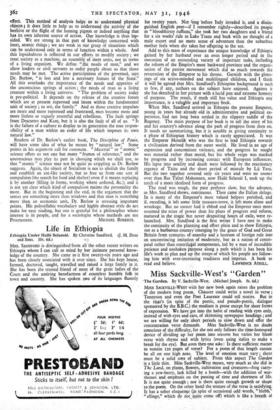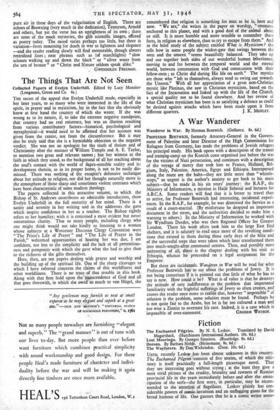Miss Sackville-West's "Garden"'
-The Garden. By V. Sackville-West. (Michael Joseph. 8s. 6d.) MISS SACKVILLE-WEST with her new book again raises the problem of the modern long poem. Chaucer could write a novel in verse ; Tennyson and even the Poet Laureate could tell stories. But in the 1940's (in spite of the poetic, and pseudo-poetic, dialogue sponsored by the B.B.C.) the medium is prose except for short forms of expression. We have got into the habit of reading with eyes only, instead of with eyes and ears, of skimming nswspaper headings ; and we are willing for only .,short periods to slow down and offer the concentration verse demands. Miss Sackville-West is no doubt conscious of the difficulty, for she not only follows the time-honoured device of dividing up her poem into seasons but varies her blank verse with rhyme and with lyrics (even using italics to make a break for the eye). But even then one asks : Is there sufficient matter to sustain 120 pages of verse? For a poem of that length cannot be all on one high note. The level of emotion must vary ; there must be a solid core of subject. From this aspect The Garden is a little thin. Miss Sackville-West muses, very much as she did in The Land, on plants, flowers, cultivation and creatures—frog carry- ing a yew-berry, lark killed by a bomb—with the addition of war- themes and emphasis on the passing of time and shortness of life. It is not quite enough ; nor is there quite enough growth or shape to the poem. On the other hand the texture of the verse is satisfying. It has a sober eloquence (in spite of occasional odd words, " blebb," " ellinge," which do not quite come off) which is like a breath of pure air in these days of the vulgarisation of English. There are echoes of Browning (very much in the dedication), Tennyson, Arnold and others, but yet the verse has an uprightness of its own ; there are none of the mock mysteries, the glib scientific images, offered as poetry today. The mood varies perhaps too little, but there is variation—from mourning for death in war to lightness and elegance —and the reader reading slowly will find memorable, though always restrained lines; neat phrases such as (cif searchlights) "slow scissors walking up and down the black" or "silver water from the urn of bronze" or "Christ and Nature seldom speak alike."
GWENDOLEN FREEMAN.































 Previous page
Previous page